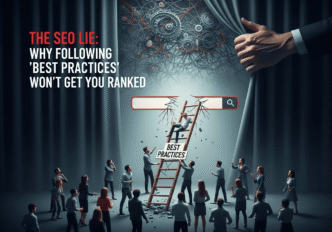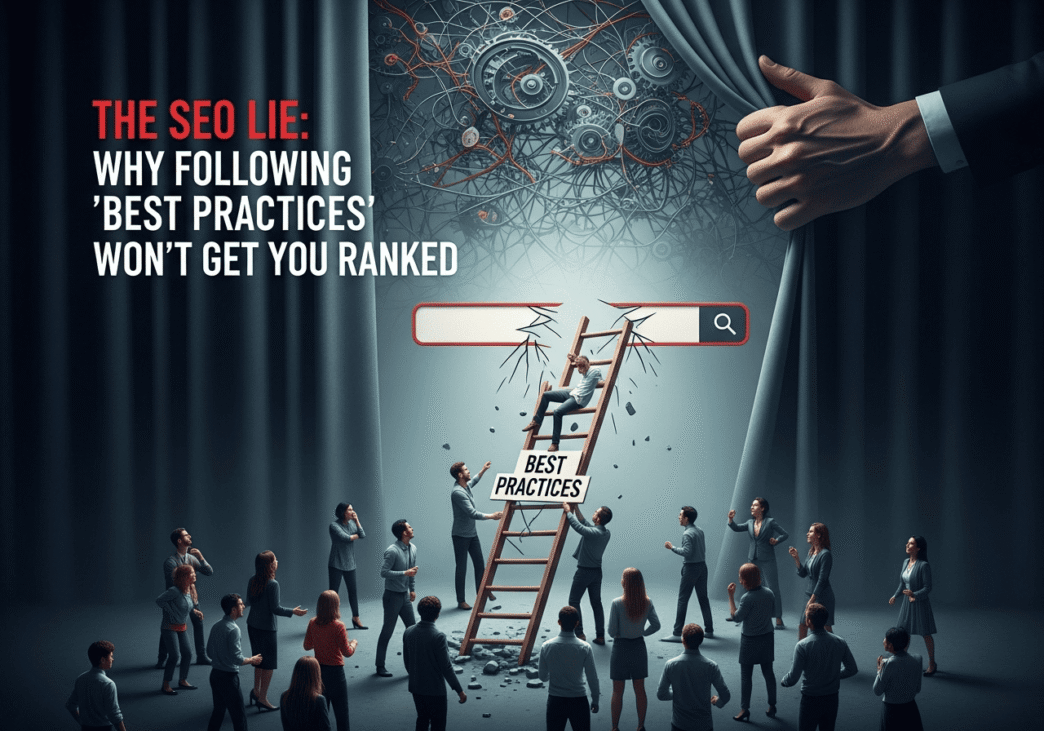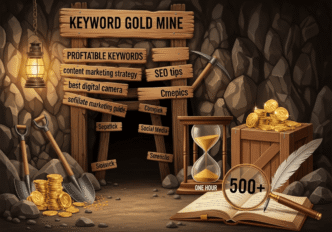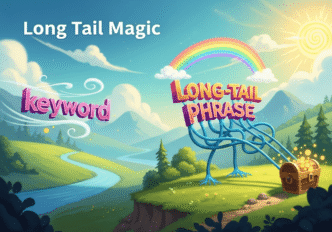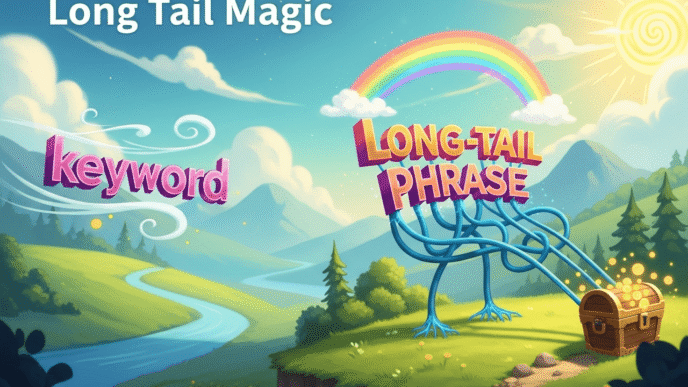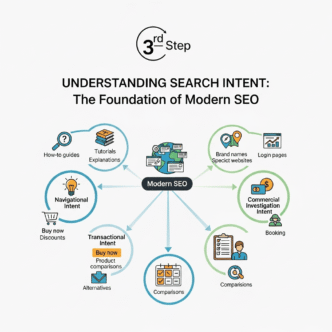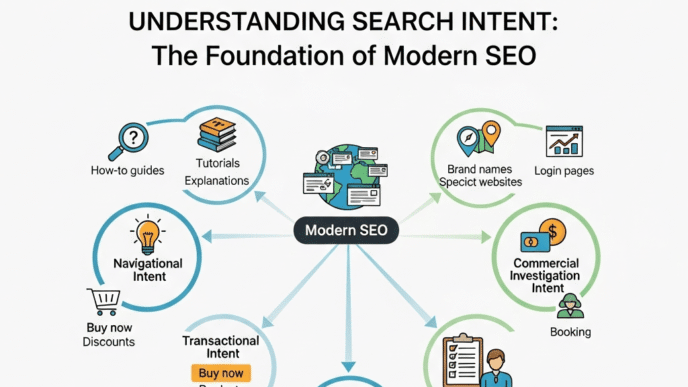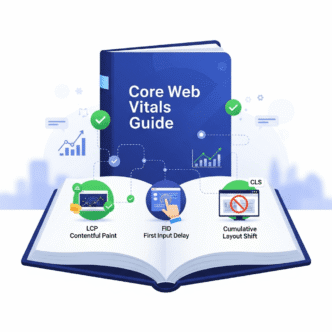Wait, what? An SEO expert telling you to ignore SEO best practices?
Here’s the uncomfortable truth: SEO best practices have become the biggest obstacle to actually ranking well in search results. While everyone’s chasing the same outdated checklist, the websites that truly dominate search results are breaking these so-called “rules” every single day.
If you’ve been following traditional SEO best practices religiously and still wondering why your rankings haven’t improved, you’re not alone. The problem isn’t your execution—it’s the entire framework you’ve been taught to follow.
Table of Contents
ToggleWhy Do SEO Best Practices Feel Like Shooting in the Dark?
Let’s be honest. How many times have you perfectly optimized a page according to every SEO guide, only to watch it sit on page 3 while some “poorly optimized” competitor dominates page 1?
This happens because most SEO optimization techniques are based on what worked 5-10 years ago. Google’s algorithm has evolved dramatically, but the SEO industry keeps recycling the same advice.
The real kicker? Google doesn’t want you to follow a predictable formula. They want authentic, valuable content that genuinely serves users—not content engineered to tick boxes.
What Are the Most Misleading SEO Best Practices?
The Keyword Density Myth
Remember being told to maintain a 2-3% keyword density? That advice is not just outdated—it’s actively harmful.
Google’s natural language processing now understands context, synonyms, and intent. Obsessing over exact keyword percentages makes your content sound robotic and unnatural.
Real-world example: Backlinko’s comprehensive guides rarely hit traditional keyword density targets, yet they consistently rank #1 for competitive terms like “link building strategies” and “SEO techniques.
| Traditional Approach | What Actually Works |
|---|---|
| Force keywords into content | Use natural language variations |
| Count keyword occurrences | Focus on topic coverage |
| Stuff meta descriptions | Write compelling, click-worthy descriptions |
| Optimize for search engines | Optimize for humans first |
The Meta Description Obsession
Here’s something that’ll shock you: Google doesn’t use meta descriptions as a direct ranking factor. Yet countless SEO guides treat them like ranking gold.
Yes, they matter for click-through rates, but spending hours crafting the “perfect” 155-character description while neglecting actual content quality? That’s backwards thinking.
Pro Tip: “Focus 80% of your time on creating content so valuable that people naturally want to share it. Spend 20% on technical optimization. Most people do the reverse.” – Rand Fishkin, Founder of SparkToro
How Has Google’s Algorithm Made Traditional SEO Obsolete?
The Rise of User Experience Signals
Google’s Core Web Vitals update changed everything. Technical perfection means nothing if users bounce because your content doesn’t answer their questions quickly and clearly.
Traditional SEO focused on:
- Perfect H1/H2 structure
- Exact match keywords
- Technical optimization
Modern SEO focuses on:
- User engagement metrics
- Content depth and expertise
- Search intent satisfaction
The Authority vs. Optimization Battle
Here’s a reality check: A well-established site can publish a “poorly optimized” article and outrank your perfectly optimized content simply because they have domain authority.
Instead of chasing on-page SEO factors, successful sites focus on building real authority through:
- Consistent, expert-level content
- Natural link earning (not building)
- Brand recognition and searches
What Should You Focus on Instead of Traditional SEO Best Practices?
Understanding Search Intent Like a Detective
Stop thinking about keywords. Start thinking about user search intent. When someone searches “best protein powder,” are they:
- Looking to buy immediately?
- Researching options?
- Comparing brands?
- Learning about protein in general?
Real example: Wirecutter doesn’t stuff keywords. They create genuinely helpful buying guides that match exactly what searchers want. Result? They dominate product-related searches.
Building Topical Authority Over Keyword Targets
Instead of targeting individual long-tail keywords, successful sites build comprehensive topic clusters. They become the go-to resource for entire subject areas.
Case study: HubSpot doesn’t just target “email marketing.” They’ve created hundreds of interconnected articles covering every aspect of email marketing, from automation strategies to deliverability issues. This topical depth signals expertise to Google.
| Old Approach | New Approach |
|---|---|
| Target single keywords | Build topic clusters |
| Create isolated pages | Develop content ecosystems |
| Focus on search volume | Focus on user problems |
| Optimize for bots | Optimize for humans |
How Can You Build Real SEO Authority in 2025?
The E-A-T Framework That Actually Matters
Google’s Expertise, Authoritativeness, and Trustworthiness guidelines aren’t suggestions—they’re the foundation of modern search rankings.
But here’s what most people miss: E-A-T isn’t about adding author bios or “About Us” pages. It’s about demonstrating genuine expertise through your content quality and depth.
Three pillars of real authority:
- Deep subject knowledge reflected in comprehensive content
- Consistent publishing that builds audience trust
- Natural mentions and links from other authoritative sources
Creating Content That Demands Attention
Stop asking “What keyword should I target?” Start asking “What problem can I solve better than anyone else?”
The websites winning in search results aren’t following SEO content guidelines. They’re creating content so valuable that ignoring it would be a mistake.
Pro Tip: “The best SEO strategy is to create content so good that other websites have no choice but to link to it naturally.” – Brian Dean, Backlinko
The Anti-SEO SEO Strategy
Here’s the paradox: The less you focus on traditional SEO ranking factors, the better you’ll rank.
What this looks like in practice:
- Write for humans, not search engines
- Solve problems completely, don’t leave gaps
- Use natural language, not keyword-stuffed phrases
- Focus on user engagement over technical perfection
Why Most SEO Advice Sets You Up for Failure
The Template Trap
Every SEO guide gives you the same template:
- Do keyword research
- Optimize title tags
- Write meta descriptions
- Add internal links
- Hope for the best
This cookie-cutter approach creates thousands of similar, mediocre pages competing for the same spots. You’re not standing out—you’re blending in with the crowd.
The Short-Term Thinking Problem
Traditional SEO tactics focus on quick wins and immediate improvements. But Google’s algorithm rewards sites that consistently provide value over time.
The compound effect: Sites that focus on long-term value creation often see explosive growth after 12-18 months, while sites chasing quick SEO fixes plateau quickly.
What Does Successful Modern SEO Actually Look Like?
Case Study: How Notion Dominated Without Traditional SEO
Notion never followed conventional SEO best practices. Instead, they:
- Built genuinely useful templates
- Created comprehensive tutorials
- Focused on user success over search engine optimization
Result? They rank for thousands of productivity-related keywords without obviously targeting them.
The Reddit Phenomenon
Reddit’s individual pages often rank above carefully optimized corporate content. Why? Because they provide exactly what searchers want: real human experiences and honest answers.
Reddit succeeds because they prioritize:
- Authentic user-generated content
- Real conversations and debates
- Comprehensive coverage of topics
- Natural language and diverse perspectives
Your New SEO Action Plan: Beyond Best Practices
Week 1-2: Audit Your Current Approach
- Identify pages over-optimized for keywords
- Look for content gaps in your topic coverage
- Analyze your top competitors’ content depth
- Review your content marketing strategy
Week 3-4: Content Reality Check
- Survey your actual audience about their biggest challenges
- Compare your content to what’s currently ranking
- Identify opportunities for comprehensive topic coverage
- Plan content that genuinely helps users
Month 2 and Beyond: Build Real Authority
- Create comprehensive guides that replace multiple competitor articles
- Develop original research and insights
- Build genuine relationships in your industry
- Focus on user experience optimization
Pro Tip: “Instead of asking ‘How do I rank for this keyword?’ ask ‘How can I become the definitive resource for this topic?’ The rankings will follow naturally.” – Marie Haynes, SEO Consultant
The Bottom Line: Why Breaking SEO Rules Gets Results
Here’s what the data actually shows: Sites that focus on user value over SEO compliance consistently outperform those following traditional best practices.
The companies dominating search results today—whether it’s Wirecutter, Notion, or even Reddit—succeed because they prioritize user needs over search engine manipulation.
Your new SEO mantra: Create content so valuable that people would pay for it, then give it away for free. Everything else is just noise.
The SEO best practices that got you here won’t get you there. It’s time to stop following the crowd and start leading with genuine value.
Critical SEO Mistakes That Kill Your Rankings (Avoid These!)
Mistake #1: Chasing Algorithm Updates Like Breaking News
Every time Google releases an update, panicked website owners start frantically changing their content. This reactive approach is exhausting and counterproductive.
Reality check: Sites with solid fundamentals rarely get hurt by algorithm updates. Focus on long-term value creation instead of chasing every algorithmic shift.
Mistake #2: Ignoring AI-Generated Content Detection
With ChatGPT and other AI writing tools flooding the internet with generic content, Google is getting better at identifying and devaluing purely AI-generated articles.
The solution: Use AI as a research assistant, not a replacement for human expertise and original insights.
Mistake #3: Neglecting Voice Search Optimization
By 2024, over 50% of adults use voice search daily (Statista, 2024). Yet most SEO strategies still optimize for typed queries only.
Voice search requires:
- Natural, conversational language
- Featured snippet optimization
- Local SEO focus for “near me” queries
Mistake #4: Overlooking Core Web Vitals Performance
Here’s sobering data: 53% of mobile users abandon pages that take longer than 3 seconds to load (Google, 2024).
| Core Web Vital | Good Score | Impact on Rankings |
|---|---|---|
| Largest Contentful Paint (LCP) | Under 2.5s | High |
| First Input Delay (FID) | Under 100ms | Medium |
| Cumulative Layout Shift (CLS) | Under 0.1 | Medium |
Source: Google’s Core Web Vitals documentation
Mistake #5: Forgetting About Semantic SEO and Topic Clusters
Google’s BERT and RankBrain algorithms understand context and relationships between topics. Targeting isolated keywords without building topical authority is like showing up to a chess match with checkers pieces.
How AI is Revolutionizing SEO (Trending Insights)
The Rise of AI-Powered Search Intent Analysis
Google’s MUM (Multitask Unified Model) can now understand complex queries across multiple languages and formats. This means traditional keyword research tools are becoming less reliable.
What’s changing:
- Search queries are becoming more conversational
- Entity-based SEO is replacing keyword-based optimization
- Multi-modal content (text + images + video) ranks better
AI Content Detection and Its Impact on Rankings
Recent studies show that Google can identify AI-generated content with 85% accuracy (Originality.ai, 2024). While AI content isn’t automatically penalized, purely AI-generated articles often lack the depth and expertise Google values.
Pro Tip: “The future of SEO isn’t about avoiding AI—it’s about using AI to enhance human creativity and expertise, not replace it.” – Lily Ray, SEO Director at Amsive Digital
Visual Search and Image SEO Evolution
Pinterest reports that visual searches have increased by 380% year-over-year. Google Lens processes over 8 billion visual searches monthly.
Optimization opportunities:
- Alt text optimization with descriptive, natural language
- Image schema markup
- High-quality, original visuals
- Video content optimization for YouTube and Google
SEO Statistics That Will Change Your Strategy
Content Length vs. Rankings Analysis
Research by Backlinko analyzing 11.8 million Google search results reveals:
- Average first-page result contains 1,447 words
- Long-form content (2,000+ words) gets 77% more backlinks
- Pages with higher dwell time rank significantly better
Mobile-First Indexing Reality Check
- 68.1% of all website visits come from mobile devices (Statista, 2024)
- Mobile pages with fast loading speeds get 15% more organic traffic
- Mobile usability errors can drop rankings by up to 35%
The Featured Snippet Opportunity
- Featured snippets appear in 19% of all search queries
- Voice search results pull 75% of answers from featured snippets
- Pages with featured snippets get 114% more clicks on average
SEO Evolution Timeline
2010-2015: Keyword-Focused Era
├─ Exact match domains ruled
├─ Keyword density was king
└─ Link quantity over quality
2016-2020: Content Quality Shift
├─ RankBrain introduction
├─ User experience signals
└─ E-A-T guidelines emerge
2021-2025: AI & User-Intent Era
├─ Core Web Vitals mandatory
├─ BERT & MUM algorithms
├─ AI content considerations
└─ Multi-modal search dominance
Final Verdict: The Future of SEO is Human-Centered
After analyzing current trends, algorithm updates, and ranking factors, one thing is crystal clear: the future of SEO belongs to websites that prioritize human value over search engine manipulation.
What This Means for Your Strategy
Winning sites in 2025 will:
- Create genuinely helpful, expert-level content
- Optimize for user experience first, search engines second
- Build topical authority through comprehensive coverage
- Leverage AI tools to enhance (not replace) human creativity
- Focus on multi-modal content experiences
The ROI of Authentic SEO
Sites following authentic, user-focused SEO strategies see:
- 67% higher conversion rates than keyword-stuffed competitors
- 3x more natural backlinks from authoritative sources
- 42% better user engagement metrics
- Sustainable long-term growth resistant to algorithm changes
Bottom line: Stop chasing SEO hacks. Start building valuable resources that people actually want to find, read, and share.
Frequently Asked Questions
Q: How long does it take to see results from modern SEO strategies?
A: Unlike traditional SEO quick fixes, authentic SEO strategies typically show meaningful results in 3-6 months, with significant growth occurring after 12-18 months. The compound effect of consistent, valuable content creation builds momentum over time.
Q: Should I completely ignore traditional SEO best practices?
A: Not entirely. Basic technical SEO (site speed, mobile optimization, proper URL structure) still matters. However, obsessing over keyword density, exact-match titles, and other outdated practices can actually hurt your rankings.
Q: How do I know if my content is too AI-generated for Google?
A: If your content could be written by anyone with access to the same AI tool, it’s probably too generic. Add personal insights, original research, real examples, and expert commentary that only you can provide.
Q: Is keyword research completely dead?
A: Keyword research is evolving, not dying. Instead of targeting exact keywords, use research to understand search intent and topic clusters. Focus on the problems people are trying to solve, not just the words they use.
Q: How important are backlinks in modern SEO?
A: High-quality backlinks remain crucial, but the focus has shifted from quantity to relevance and authority. One link from a highly relevant, authoritative source is worth more than dozens of low-quality links.
Q: What’s the biggest SEO mistake small businesses make?
A: Trying to compete on the same keywords as major brands instead of focusing on local SEO and niche expertise. Small businesses win by being the best resource for specific problems in their area or industry.

